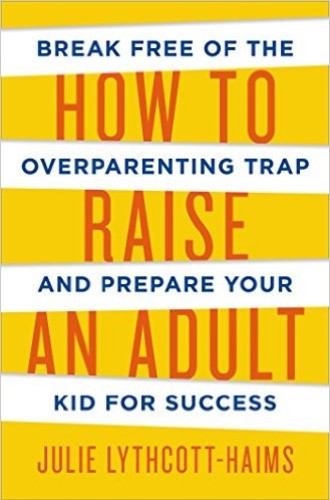Room to grow up
Are today’s young adults more immature than their age mates in previous generations? Yes, says Julie Lythcott-Haims, who was Stanford University’s dean of freshmen and undergraduate advising for more than ten years. But it’s not their fault.
During her time at Stanford, Lythcott-Haims saw increasing numbers of what she calls “existentially impotent” university students. They may have been high school valedictorians, but they needed parental help to write their college application essays and term papers, to choose their majors, to get them out of bed in the morning, to give them directions when they got lost in strange towns, to intercede when they faced problems with professors, to find and furnish their apartments, and, in one case, to figure out how to get a large package from the sidewalk to a dorm room (Mom eventually called the resident fellow on her son’s behalf).
Read our latest issue or browse back issues.
As a mother raising two children in high-pressure Palo Alto, California, Lythcott-Haims is well acquainted with the way these helpless kids were raised. Helicopter parent is the popular derogatory term for “a parent who hovers over a child in a way that runs counter to the parent’s responsibility to raise a child to independence.” Yet in many upper-middle-class communities, not hovering is equated with dereliction of duty.
Well-educated, affluent parents set extremely high standards for themselves and, by extension, for their children. If parenting is not their full-time job, it is at least their ever-present preoccupation. No aspect of their children’s lives escapes their attention. As one Silicon Valley mother explains, “When you’re a woman in this area that isn’t a CEO of a company, you feel you have to do all this stuff to prove you are capable—of something.”
Unfortunately, this intense approach to raising children produces exhausted parents, incompetent children, and high rates of depression all around. It does not produce adults equipped to deal with the challenges they will face after graduation.
The problem, Lythcott-Haims believes, is that helicopter parents do not allow their children space to develop the skills they will need in order to succeed in the adult world. Kids who are never allowed unstructured playtime have little opportunity to dream and create. Kids whose parents intervene whenever they encounter real or imagined slights are afraid to stand up for themselves. Kids who are protected from every conceivable danger avoid taking risks. Kids who are not allowed to fail develop few resources for dealing with setbacks. Forced to follow a rigorous, check-listed college-preparatory lifestyle from cradle through high school, they don’t learn how to make decisions and work independently. With continued propping up from their parents and professors, they may do well in college. But when they hit the hard, cruel realities of the working world, many millennials are at sea.
After providing copious examples of the serious harm today’s intense parenting style is doing to the rising generation, Lythcott-Haims switches from description to prescription. The goal of parents, she says, should be to help their children develop “self-efficacy”—that is, the adult ability “to complete a task, reach goals, and manage a situation.”
“Kids don’t acquire life skills by magic at the stroke of midnight on their eighteenth birthday,” she writes. “Childhood is meant to be the training ground. Parents can assist—not by always being there to do it or to tell them how to do it via cell phone—but by getting out of the way and letting kids figure things out for themselves.” In case parents can’t figure out how to do this, she offers multiple chapters full of real-life anecdotes and parenting strategies.
Don’t scoff. These aren’t the usual self-help tips endlessly recycled in parenting best sellers. Think of them as encouragement for people who, finding themselves surrounded by frantically whirring helicopter parents, need affirmation and guidance as they look for a better way.
It’s OK if your kid is sometimes bored, Lythcott-Haims says in her chapter on play. It’s good modeling when you and a friend relax on lawn chairs “chatting, laughing, and enjoying yourselves over the beverage of your choice.” It’s vital that kids help around the house, that they learn to think critically and even to disagree with you, that they experience “mistakes and curveballs.” And it’s absolutely fine if they end up going to a college that is not one of the top ten ranked by U.S. News and World Report.
Lythcott-Haims hates the U.S. News annual college issue. College presidents, she says, call it the “beauty pageant.” Its apparently objective data is sometimes manipulated by the schools or by the magazine, she claims, and anyway, nearly a quarter of its ranking basis is totally subjective. Yet parents study it intently, and they “mistakenly regard the rankings as the true indicators of the relative value of each college’s education.” The result is predictable: top-ranked colleges get more selective each year (Stanford and Harvard, Lythcott-Haims’s alma maters, now accept fewer than 6 percent of applicants), driven parents arrange their children’s entire childhoods around activities aimed at tipping the admissions scales in their favor, and an alarming number of kids miss out on childhood and do not develop the skills needed for successful adulthood.
It’s all so unnecessary, says this former college adviser. Hundreds of colleges and universities offer an excellent education. For a different approach to ranking colleges, she suggests checking out alumnifactor.com, whose criteria are not selectivity and test scores but “how alumni . . . fare out in the world, and how they feel about themselves and their lives.”
“If we focus on encouraging our kids to look for schools where they can feel a sense of fit and belonging,” she writes, “and if we pull back those blinders that have us and our kids focusing on only the most highly selective schools and be proud of where our kids apply and get admitted, . . . things will turn out just fine.”
That is the message of How to Raise an Adult: everything’s going to be OK. So relax. Pay attention to your own passions, health, relationships, and joys, and give your kids time and space to pay attention to theirs.
“Yes, this author of a book on parenting is saying you might want to stop reading so many books on parenting and give yourself a bit more credit,” Lythcott-Haims writes. “Slow down, take a deep breath, look within, hug your partner, and hug your kid: Parenting doesn’t have to feel so hard anymore. You’ve got this.”
Unfortunately, the people who would benefit most from this book—those helicopter parents who are trying so hard to protect their children from all harm that they end up creating seriously stunted young adults—will likely stop reading it after the first chapter or two, especially if they received it as a gift from critical grandparents. And that’s too bad, because the world may not need more Ivy League graduates. It does, however, need all the functional adults it can get.






